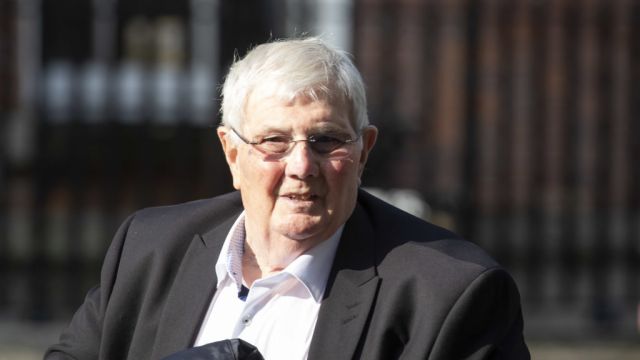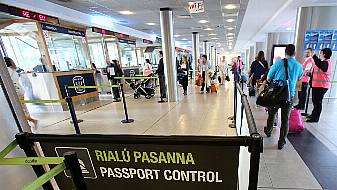Before the jury in the Stardust inquest began deliberations, the former manager of the nightclub, Eamon Butterly, mounted a High Court bid to bring a legal challenge which could have delayed the inquest's verdicts.
The case can now be reported on following the returning of the verdicts at the inquest into the deaths of 48 young people at the Stardust Nightclub on February 14th, 1981.
Just before the Easter weekend, Mr Butterly sought permission to bring judicial review proceedings challenging decisions made by Coroner Dr Myra Cullinane to allow the jury to return a verdict of unlawful killing.
The application came before Mr Justice Tony O'Connor.
In a judgement, Mr Justice O'Connor refused Mr Butterly's application for both leave to bring the challenge, and for the inquest to be put on hold pending the outcome of the challenge.
The application was made shortly before Dr Cullinane had commenced her charge to the jury in the inquest.
Among Mr Butterly's arguments were that the coroner had erred in law in separate decisions she made in March 2024 to allow the jury return a verdict of unlawful killing, where there is a limited number of connected people associated with such a verdict according to the evidence adduced.
The court heard that 21 people, 18 of whom were identified, were mentioned at the inquest, who it was submitted could be associated with a verdict of unlawful killing.
Mr Butterly's lawyers argued that such a verdict would be highly prejudicial and would damage his reputation, as it was feared that blame could be attributed to him.
It was submitted that it is not lawfully open for a jury to attribute blame to any individual or individuals.
Opposition
Lawyers for 47 of the 48 victims opposed the application, and urged the court not to grant leave nor the stay.
Lawyers for the coroner told the court it was their client's preference that she be allowed to proceed with her charge to the jury.
After considering the matter, Mr Justice O'Connor said Mr Butterly was looking for an order from the court that the coroner instruct the jury that a verdict of unlawful killing was not an available verdict.
The judge said he was satisfied to dismiss the application, adding he was not satisfied that Dr Cullinane had misdirected herself with respect to the identifiable issue.
She was alert to the caution given in a High Court judgement, given in earlier proceedings brought by Mr Butterly in relation to the potential verdict of unlawful killing, he said.
The judge added that the coroner knew the extent of the evidence given, and she can direct the jury, not only in relation to their consideration of the evidence and the limited verdicts which can be delivered, but also the law.
There was, he added, no allegation of lack of fair procedures, and it is premature to review what the applicant fears could be instructions and guidance given by the coroner.
The judge also rejected claims by Mr Butterly that he would be left without an effective remedy if an undesirable verdict from the plaintiff's perspective was given.
During the hearing, the judge asked if the challenge was premature, and asked if such an action should be brought after the verdict had been given.
The court also said it was undesirable for a court to intervene or interfere with an ongoing investigation or process.
The grant of a stay pending the outcome of judicial review proceedings would further delay the inquest, which was something that greatly concerned the court, the judge said.
When the application was made the court, it was noted that the inquest had been running for over 120 days, and the jury had considered over 80 days of evidence.
The judge said the verdict of unlawful killing was open to a jury as long as they are properly cautioned and directed to the fact that they cannot identify any persons.
He added that the jury are also not permitted to expressly or impliedly attribute liability to any identified or identifiable person in the making of their findings or returning of their verdict.
Reporting restriction
During the proceedings, Mr Justice O'Connor agreed with lawyers for the parties that the media should not report on the application until after the verdict had been given.
Any reporting of the application may have affected or influenced the jury while they were attempting to reach their decision, which was something that was extremely undesirable, the court heard.
Noting the court's obligations that justice be administered in public, the judge agreed that nothing should be reported on the application until after the verdict was given.
Mr Butterly's bid was the second judicial review he brought in respect of a possible verdict of unlawful killing.
In November 2022, Mr Justice Charles Meenan rejected Mr Butterly's claim that the inquest could not make findings of unlawful killing.
The judge said this can only be in "appropriate circumstances" and only where no person or persons is identified or identifiable.
Mr Butterly had sought to prevent the coroner from conducting the inquest in a way in which he believed would make him "a target for a verdict of unlawful killing".
The coroner, the Minister for Justice, and the Attorney General, opposed the application, while the families of the deceased, the Garda Commissioner and Dublin City Council were notice parties.
The judge refused Mr Butterly's application saying he was satisfied that the ruling by Ms Cullinane in February 2022, that a verdict of unlawful killing could not be ruled out at that stage, was correct in law.
Ms Cullinane's grounds for doing so included that she could give appropriate directions to the jury and that it would be open to legal teams of all interested parties to make any necessary submissions as to what directions should be given, the judge held.
Mr Justice Meenan said an inquest is an inquisitorial hearing to establish the facts concerning the who, how, when, where and circumstances of a person’s death.
It is not an exercise of considering or apportioning blame or exoneration, he said.
Liability
The Coroners Acts prohibit questions of civil or criminal liability being considered or investigated and verdicts censuring or exonerating a person, he said.
These restrictions, however, do not prevent an inquest establishing the facts concerning the circumstances of a person’s death, even though those facts may be ultimately relevant in another forum dealing with criminal or civil liability, he said.
Parties before an inquest are entitled to fair procedures, but this entitlement is limited given the statutory confines within which an inquest takes place, he said.
Sections 30 and 31 of the Coroners Acts do not prohibit verdicts of unlawful killing, he said.

Questions of civil or criminal liability or verdicts containing censure or exoneration arise where the person or persons concerned are identified or identifiable.
"In appropriate circumstances there may be a verdict of unlawful killing but only where no person(s) is identified or identifiable," he said.
The law also gives a coroner discretion to consider the circumstances of a person’s death. It may be that the more detailed the evidence is on the circumstances of the death "the less permissible will be a verdict of unlawful killing", he added.
"It is for the coroner, having heard all the evidence, who gave the evidence, and considered the submissions of the parties, to direct the jury as to the permissible verdicts."







